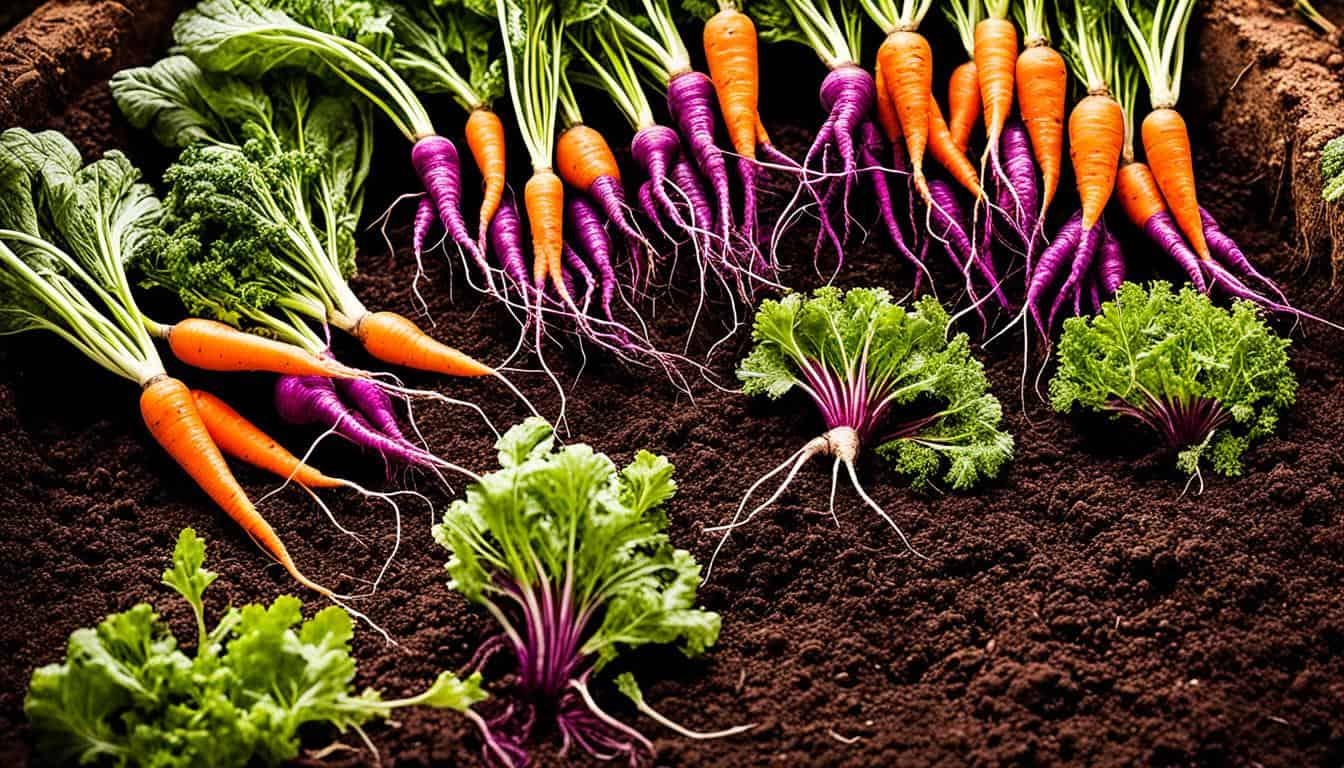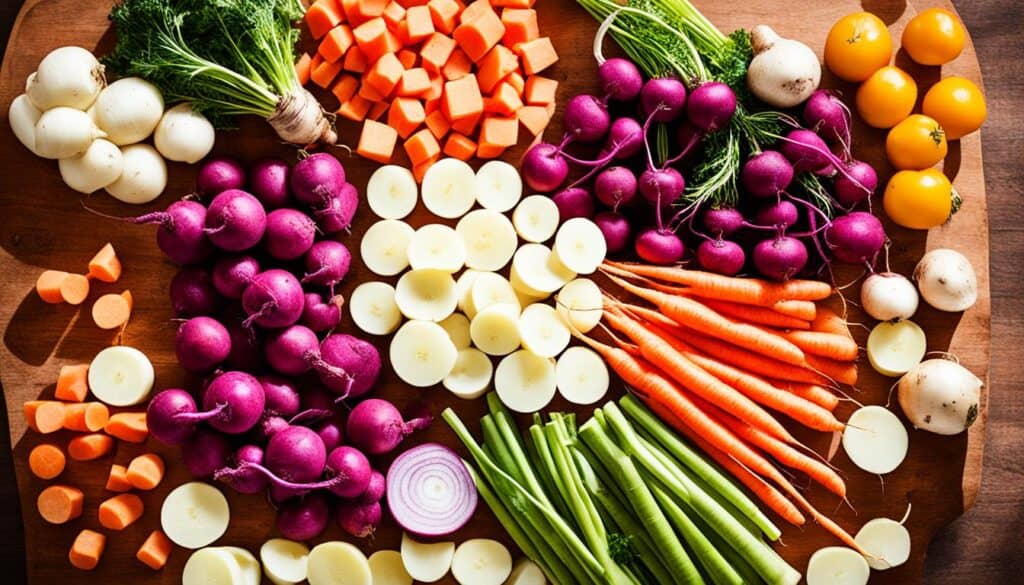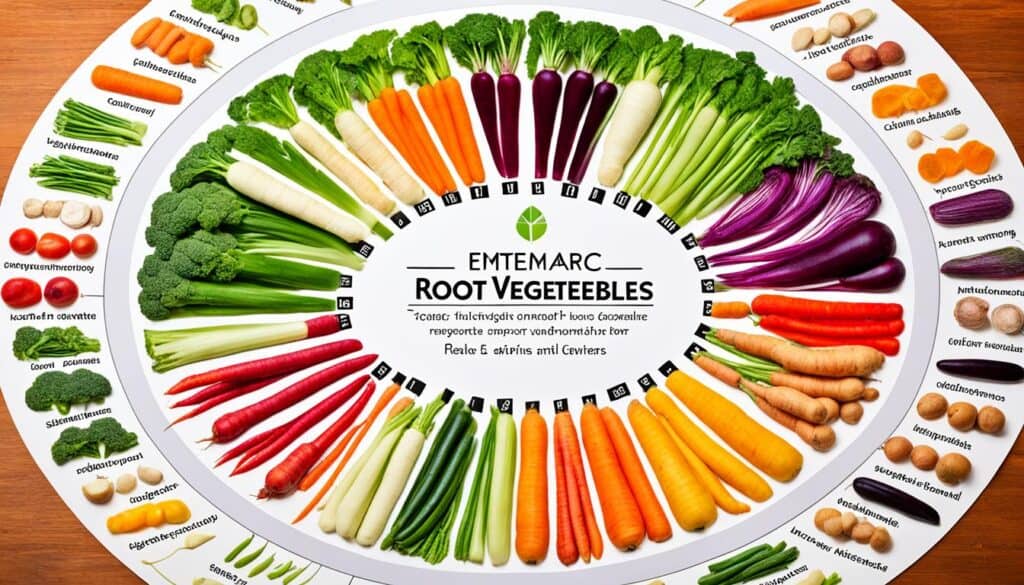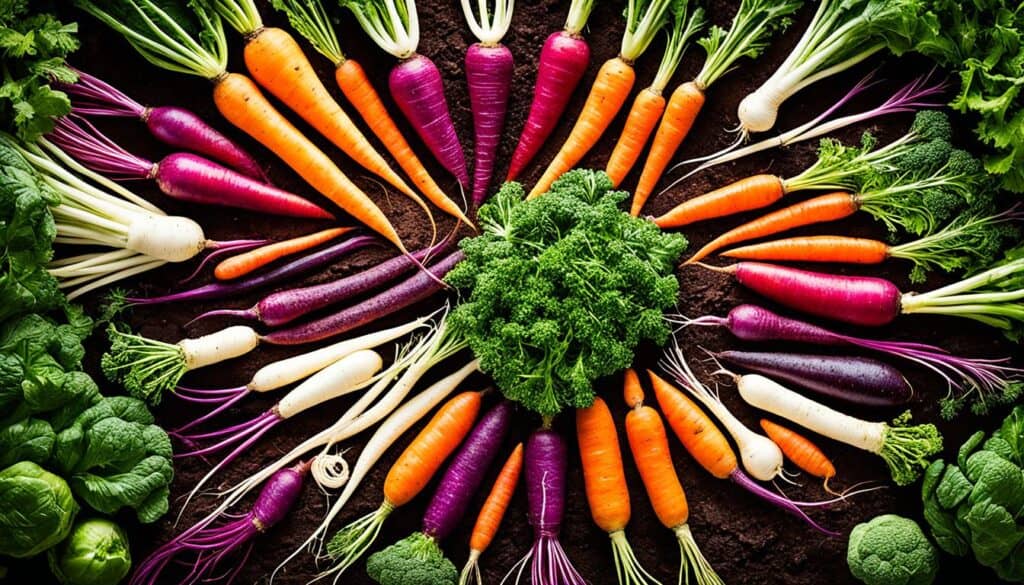Did you know that root vegetables have a special place in every vegetable garden? These humble, below-ground treasures are not only versatile and easy to grow, but they also offer a wide array of flavors, textures, and nutritional benefits.
Popular root vegetables include beets, carrots, radishes, onions, parsnips, rutabagas, turnips, celeriac, horseradish, Jerusalem artichokes, and sweet potatoes. With such a diverse selection, there’s a root vegetable for every taste preference and culinary style.
In this comprehensive guide, I’ll take you on a journey through the world of root vegetables. We’ll explore the different types, delve into their numerous health benefits, learn how to cook them to perfection, discover their nutritional value, and even explore some delicious recipes to satisfy your taste buds.
Key Takeaways:
- Root vegetables are versatile, easy to grow, and offer a range of flavors and textures.
- Popular root vegetables include beets, carrots, radishes, onions, parsnips, rutabagas, turnips, celeriac, horseradish, Jerusalem artichokes, and sweet potatoes.
- Root vegetables are packed with essential vitamins, minerals, and antioxidants that contribute to overall health and well-being.
- They can be cooked in various ways, such as roasting, steaming, or mashing, to bring out their unique flavors.
- Root vegetables are a rich source of fiber, vitamins A and C, potassium, and other nutrients.
Types of Root Vegetables
When it comes to root vegetables, there is a wide variety of options to choose from. Each type of root vegetable has its own unique characteristics, flavors, and culinary uses. Here are some popular examples:
- Beets: known for their deep purple color and earthy flavor, beets are a versatile root vegetable that can be enjoyed roasted, pickled, or even blended into smoothies.
- Carrots: these vibrant orange roots are a staple in many cuisines. They can be eaten raw, steamed, roasted, or used as an ingredient in soups, stews, and salads.
- Radishes: with their crisp texture and peppery taste, radishes add a refreshing element to salads and can be enjoyed raw or cooked.
- Onions: while onions are typically known as a culinary ingredient, they are also root vegetables. They come in various types, including yellow, red, and white, and are used for their distinct flavor in a wide range of dishes.
- Parsnips: these creamy white roots have a sweet and nutty flavor. They can be roasted, mashed, or used in soups and stews.
- Rutabagas: a cross between a cabbage and a turnip, rutabagas have a slightly sweet and peppery taste. They can be boiled, roasted, or mashed.
- Turnips: these white or purple roots have a crisp texture and a slightly peppery flavor. They can be enjoyed raw, steamed, roasted, or used in soups and stews.
- Celeriac: also known as celery root, celeriac has a mild, celery-like flavor. It is often used in soups, stews, and salads.
- Horseradish: known for its strong and pungent flavor, horseradish is often used as a condiment or flavoring agent. It adds a kick to sauces, dips, and dressings.
- Jerusalem Artichokes: despite their name, Jerusalem artichokes are not actually artichokes but a type of sunflower root. They have a slightly sweet and nutty flavor and can be enjoyed in various recipes.
- Sweet Potatoes: these vibrant orange roots are rich in flavor and sweetness. They can be baked, roasted, mashed, or used in both sweet and savory dishes.
Benefits of Root Vegetables
Root vegetables offer numerous health benefits. They are packed with essential vitamins, minerals, and antioxidants that support overall health and well-being. Some of the benefits of root vegetables include:
- Nutritional powerhouses: Root vegetables are rich in vitamins A, C, and K, as well as several B vitamins. They also contain minerals like potassium, magnesium, and iron, which are essential for various bodily functions.
- Antioxidant-rich: Many root vegetables, such as beets and carrots, are high in antioxidants like beta-carotene and anthocyanins. These antioxidants help protect the body against harmful free radicals and reduce the risk of chronic diseases.
- Boosted immune system: Root vegetables contain immune-boosting compounds like vitamin C, which helps strengthen the immune system and protect against common illnesses.
- Improved digestion: Root vegetables are a great source of dietary fiber, which aids in digestion and promotes a healthy gut. They can help prevent constipation and support regular bowel movements.
- Cardiovascular health: Some root vegetables, such as sweet potatoes, are high in potassium, a mineral that helps regulate blood pressure and maintain a healthy heart.
If you’re looking to improve your overall health and add variety to your meals, incorporating root vegetables into your diet is a great idea. These flavorful and nutritious veggies can be enjoyed in salads, stews, soups, roasted dishes, and much more. Embrace the benefits of root vegetables and take your culinary creations to the next level!
Stay tuned for the next section, where I’ll explore different ways to cook root vegetables and bring out their delicious flavors!
How to Cook Root Vegetables
Root vegetables are incredibly versatile and can be prepared in various ways to enhance their natural flavors and textures. Whether you’re roasting, boiling, or mashing, there’s a cooking method that will bring out the best in these delicious underground delights. Here are some popular techniques to help you create mouthwatering root vegetable dishes:
1. Roasting
Roasting root vegetables is a simple yet effective method that brings out their natural sweetness and caramelizes their surfaces. Start by preheating your oven to 400°F (200°C). Peel and chop the vegetables into uniform pieces to ensure even cooking. Toss them with olive oil, salt, pepper, and your choice of herbs or spices. Arrange the vegetables on a baking sheet in a single layer and roast for 30-45 minutes, or until they are tender and golden brown. Serve as a delicious side dish or use them as a hearty addition to salads or grain bowls.
2. Boiling
Boiling root vegetables is a quick and easy way to cook them while retaining their natural flavors and nutrients. Start by peeling and chopping the vegetables into bite-sized pieces. Place them in a pot of boiling water and cook until tender. The cooking time will vary depending on the size and type of vegetable, so be sure to check for doneness by piercing them with a fork. Drain the cooked vegetables and season them with butter, salt, and pepper to taste. Boiled root vegetables are perfect for mashing, adding to soups, or using as a base for a hearty vegetable stew.
3. Steaming
Steaming is a gentle cooking method that helps preserve the nutrients and vibrant colors of root vegetables. To steam root vegetables, peel and cut them into evenly sized pieces. Place them in a steamer basket over a pot of boiling water. Cover the pot and steam until the vegetables are tender when pierced with a fork. This usually takes about 10-15 minutes, depending on the size of the pieces. Once cooked, drizzle the steamed vegetables with a little olive oil or melted butter and season them with salt, pepper, and herbs. Steamed root vegetables make a healthy and flavorful side dish or can be used as a base for salads and stir-fries.
4. Mashing
Mashing root vegetables creates a creamy and comforting side dish that pairs well with a variety of main courses. Start by peeling and cutting the vegetables into small chunks. Place them in a pot of salted water and bring to a boil. Cook until the vegetables are tender, then drain. Mash the cooked vegetables using a potato masher or a fork until smooth and creamy. Add butter, milk or cream, and your choice of seasonings, such as garlic, herbs, or spices. Mix well and adjust the consistency and flavor as desired. Serve the mashed root vegetables alongside roasted meats or poultry for a delightful and satisfying meal.
5. Grilling
Grilling root vegetables can add a smoky and charred flavor to elevate their taste. Start by preheating your grill to medium-high heat. Peel and slice the vegetables into ¼-inch thick pieces. Brush them lightly with olive oil, then season with salt, pepper, and any desired herbs or spices. Place the vegetables directly on the grill grates and cook for 3-5 minutes per side, or until they are tender and grill marks appear. Remove from the grill and serve as a delicious side dish or add them to sandwiches, wraps, or salads for a flavorful twist.
Experimenting with different cooking methods will allow you to explore the diverse flavors and textures of root vegetables. Whether you prefer the earthy sweetness of roasted carrots or the creamy comfort of mashed potatoes, these cooking techniques will help you make the most of your root vegetable culinary adventures.
Nutritional Value of Root Vegetables
Root vegetables are not only delicious, but they also offer a wealth of essential nutrients that are beneficial for our health. Let’s explore the key nutritional highlights of these underground delights:
- Vitamins: Root vegetables are rich in vitamins, including vitamin A, vitamin C, and various B vitamins. Vitamin A promotes healthy vision and immune function, while vitamin C is important for immune support and collagen production. B vitamins play a vital role in energy metabolism and brain function.
- Minerals: These veggies are a great source of minerals like potassium, magnesium, and iron. Potassium contributes to heart health and helps regulate blood pressure. Magnesium is essential for healthy nerve function and bone health. Iron is crucial for the production of red blood cells and oxygen transport throughout the body.
- Fiber: Root vegetables are packed with dietary fiber, which aids digestion, promotes satiety, and supports a healthy gut. Fiber also helps regulate blood sugar levels and cholesterol levels, reducing the risk of chronic diseases.
- Antioxidants: Many root vegetables contain antioxidants, such as beta-carotene and anthocyanins, which help protect cells from damage caused by harmful free radicals. These antioxidants have anti-inflammatory properties and may reduce the risk of chronic diseases, including heart disease and certain types of cancer.
By incorporating a variety of root vegetables into your diet, you can enjoy their delicious flavors while reaping the nutritional benefits they provide. So why not try adding some roasted beets, mashed sweet potatoes, or carrot sticks to your next meal?
Root vegetables are not only delicious, but they also offer a wealth of essential nutrients that are beneficial for our health.
Root Vegetable Recipes
Root vegetables are not only nutritious but also incredibly versatile when it comes to cooking. From simple side dishes to hearty mains, these delicious recipes will showcase the rich flavors and textures of root vegetables.
1. Roasted Root Vegetables
Ingredients:
- Carrots
- Parsnips
- Beets
- Turnips
- Olive oil
- Garlic
- Thyme
- Salt and pepper
Instructions:
- Preheat the oven to 425°F (220°C).
- Peel and chop the root vegetables into bite-sized pieces.
- In a large bowl, combine the vegetables with olive oil, minced garlic, thyme, salt, and pepper. Toss to coat evenly.
- Spread the vegetables in a single layer on a baking sheet.
- Roast in the oven for 30-35 minutes, stirring occasionally, until the vegetables are tender and golden brown.
- Serve hot as a delicious side dish.
2. Root Vegetable Soup
Ingredients:
- Onion
- Carrots
- Celery
- Potatoes
- Parsnips
- Turnips
- Vegetable broth
- Garlic powder
- Dried thyme
- Salt and pepper
Instructions:
- Heat olive oil in a large pot over medium heat.
- Add diced onion, carrots, celery, potatoes, parsnips, and turnips to the pot. Sauté for 5 minutes until the vegetables are slightly softened.
- Pour in vegetable broth, garlic powder, dried thyme, salt, and pepper. Stir well.
- Bring the soup to a boil, then reduce the heat and simmer for 20-25 minutes until the vegetables are tender.
- Use an immersion blender or regular blender to puree the soup until smooth.
- Season with additional salt and pepper if needed.
- Serve hot with crusty bread for a comforting meal.
Root vegetables add depth and earthiness to any dish, whether roasted, sautéed, or pureed into a creamy soup. Their natural sweetness and vibrant colors make them a delightful addition to your table.
Root Vegetable Gardening
Growing your own root vegetables can be a rewarding and satisfying experience. Not only do you get to enjoy the freshest produce straight from your garden, but you also have the satisfaction of knowing exactly how your vegetables were grown. Here are some tips for successful root vegetable gardening:
- Choose the right location: Root vegetables thrive in well-drained soil and full sun. Select a location in your garden that receives at least 6-8 hours of direct sunlight per day.
- Prepare the soil: Before planting, make sure the soil is loose and well-drained. Remove any rocks, weeds, or debris that may hinder root growth.
- Planting seeds: Sow the seeds directly into the garden bed according to the packet instructions. Keep in mind the recommended spacing between plants to allow for proper root development.
- Watering: Root vegetables need consistent moisture to grow properly. Water the plants deeply once or twice a week, depending on the weather conditions.
- Weed control: Keep the area around your root vegetables free from weeds, as they can compete for nutrients and water.
- Fertilizing: Root vegetables benefit from a balanced fertilizer applied at planting time. Avoid using high-nitrogen fertilizers, as they can promote excessive leaf growth instead of root development.
- Harvesting: Check the recommended harvest time for each specific root vegetable variety. Gently loosen the soil around the plants and lift the vegetables from the ground. Be careful not to damage the roots.
By following these tips, you’ll be well on your way to a successful root vegetable gardening experience. Enjoy the delicious flavors and nutritional benefits that come with growing your own underground delights!
Root Vegetable Storage
Proper storage is essential to prolong the shelf life and maintain the freshness of root vegetables. Here are some tips to help you store your root vegetables:
- Remove the Tops: Before storing root vegetables, remove any leafy tops or greens. The tops draw moisture from the roots, leading to faster spoilage.
- Separate for Storage: Keep root vegetables separate from other fruits and vegetables. Some root vegetables release ethylene gas, which can accelerate ripening and spoilage of nearby produce.
- Cool and Dark Environment: Store root vegetables in a cool, dark place, preferably between 32°F (0°C) and 40°F (4°C). This temperature range helps slow down the rate of sprouting and prevents decay.
- Avoid Moisture: Ensure the storage area is dry to prevent mold and bacterial growth. Excess moisture can cause rotting and spoilage of root vegetables.
- Use Ventilated Containers: Store root vegetables in breathable containers, such as mesh bags or baskets, to allow for proper air circulation.
- Check Regularly: Periodically inspect your stored root vegetables and remove any spoiled or damaged ones promptly. This helps prevent the spread of rot and maintains the longevity of the remaining vegetables.
By following these storage tips, you can enjoy the freshness and flavor of your root vegetables for a longer period.
Quote:
“Proper storage is crucial for maintaining the quality and taste of root vegetables. By providing the right conditions, you can extend their shelf life and savor their earthy goodness for weeks or even months.” – Jane Adams, Home Gardening Expert
Continue reading to discover the health benefits of root vegetables and how they can contribute to your overall well-being.
Root Vegetable Health Benefits
Root vegetables are not only delicious additions to our meals but also offer a range of health benefits. Their rich nutritional profiles make them an excellent choice for maintaining overall well-being. Let’s take a closer look at some specific health benefits of root vegetables:
- Improved Digestion: Root vegetables are a great source of dietary fiber, which aids in proper digestion and promotes a healthy gut. They can help prevent constipation, regulate bowel movements, and support a healthy digestive system.
- Boosted Immunity: These vegetables are packed with essential vitamins, minerals, and antioxidants that strengthen the immune system. They help to ward off illnesses and protect the body against harmful pathogens and free radicals.
- Heart Health: Many root vegetables contain heart-healthy nutrients such as potassium and folate. These nutrients support healthy blood pressure levels, reduce the risk of heart disease, and maintain a healthy cardiovascular system.
- Weight Management: Root vegetables are a low-calorie and nutrient-dense food option, making them an excellent choice for weight management. They are high in fiber, which helps you feel fuller for longer and reduces overeating.
- Blood Sugar Regulation: Some root vegetables, such as sweet potatoes and carrots, have a low glycemic index, meaning they release sugars slowly into the bloodstream. This helps regulate blood sugar levels, making them suitable for individuals with diabetes or those looking to manage their blood sugar levels.
- Healthy Skin: The antioxidants present in root vegetables help in maintaining healthy skin by reducing oxidative stress and promoting collagen production. This can result in a youthful, radiant complexion.
“Root vegetables offer a treasure trove of health benefits, from improved digestion and boosted immunity to heart health and healthy skin. Adding these vegetables to your diet can support overall well-being and contribute to a healthy lifestyle.”
To fully enjoy the health benefits of root vegetables, it’s important to incorporate them into your regular diet. Whether roasted, steamed, or mashed, these versatile vegetables can add flavor and nutrition to various dishes.
| Root Vegetable | Nutrient | Health Benefit |
|---|---|---|
| Carrots | vitamin A, beta-carotene | improved vision and immune function |
| Beets | dietary fiber, folate | lowered blood pressure and improved heart health |
| Sweet potatoes | vitamin C, potassium | boosted immune system and healthy blood pressure |
| Parsnips | vitamin K, folate | healthy bone development and improved digestion |
| Radishes | vitamin C, antioxidants | detoxification and improved digestion |
Conclusion
Root vegetables are a true culinary delight, offering a unique combination of flavors, textures, and health benefits. From the earthy sweetness of beets and carrots to the nutty richness of parsnips and sweet potatoes, these underground treasures are a versatile addition to any kitchen.
Whether you’re searching for nutrient-rich ingredients to boost your well-being or looking to create delicious side dishes, soups, and stews, root vegetables have got you covered. With a variety of cooking methods available, you can explore their full potential and create mouthwatering dishes that will impress your family and friends.
Growing your own root vegetables can be a rewarding experience, allowing you to enjoy the satisfaction of nurturing and harvesting your own produce. With a little effort and the right techniques, you can cultivate a robust vegetable garden that will provide you with a steady supply of fresh and flavorsome root vegetables.
So, embrace the world of root vegetables and unlock a treasure trove of delectable and healthy delights. Incorporate them into your meals, experiment with different recipes, and reap the many benefits that these wonderful underground wonders have to offer.










Leave a Reply